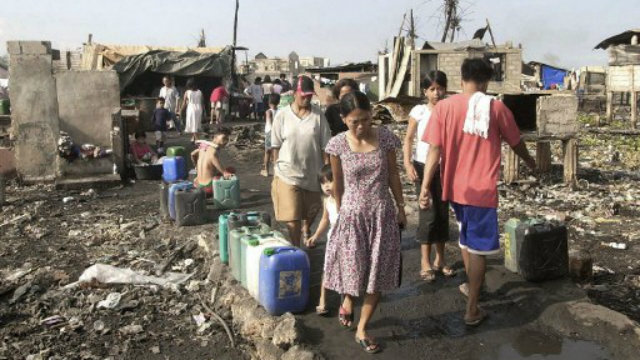SUMMARY
This is AI generated summarization, which may have errors. For context, always refer to the full article.

MANILA, Philippines – Local government officials who do not do anything about informal settlers may face administrative sanctions, Vice President Jejomar Binay has warned.
“Inaction is an offense,” Binay said, pointing out that the ballooning number of informal settlers must be dealt with by local governments.
As of 2011, according to Binay’s office, Metro Manila already has 104,219 informal settler families (ISFs) living in danger areas.
“President Benigno Aquino III had approved a P50 billion budget for the housing program for ISFs,” a statement from Binay’s office said. The National Housing Authority is expected to generate some 6,426 housing units for Metro Manila ISFs.
Binay, concurrent chair of the Housing and Urban Development Coordinating Council, said he will work closely with Local Government Secretary Mar Roxas, who is on top of disaster management. The two were rivals for the vice presidential post in the 2010 elections.
Asked by reporters whether barangay officials will be held liable, Binay said they should at least issue warnings to informal settlers in their areas.
At the same time, Binay faulted government’s changing policies on ISFs starting 1986. “May mga eleksyon na nangangako yung mga nangangako, ‘hindi kayo…gagawan ng paraan, etcetera, etcetera.’ Yun naman ang mga nakaantala dun.” (There were election periods when promises were made. ‘You will not be relocated, we will find a way, etcetera, etcetera.’ This is what delayed the process.)
Blow hot, blow cold
Binay said government relocation policies should be firm. “Kaya lang hot and cold yung policy ng relocation eh. Hot and cold yun, sorry to say, pero ilang administrasyon na yan. ’86 akong mayor. Ilang beses yun, ire-relocate namin dun sa riles ng tren, kailangan namin dun siguro mga 15 years after.”
(Relocation policies blow hot and cold. Sorry to say, it’s been several administrations already. I was mayor in ’86. Many times we were supposed to relocate those living by the railroad tracks. We will probably need 15 years after.)
Earlier this year, the government announced its intention to move about 100,000 informal settlers located on crucial waterways in Manila.
(READ: Philippines to move 100,000 informal settlers)
Binay said that given the upcoming barangay elections in October, prospective candidates should not tolerate illegal settlers at the community level.
At the same time, local government units must provide for the community needs of informal settlers who have already been relocated to their new homes.
A big sacrifice is demanded of the receiving area, he said in Filipino, adding that it is the local government that assumes responsibility in providing basic necessities.
Asked about cases wherein relocation attempts were hindered by politicians in the name of voter potential, Binay said the individuals with foremost responsiblity to explain are the barangay officials.
“Kung ang kapitan ay talagang ikot ng ikot sa kanyang area, hindi dadami yun eh,” he explained. (If the barangay captain diligently monitors his area, this won’t multiply.)
‘New communities’
In referring to the new areas of housing, Binay refrained from using the term “relocation areas.”
“We call it ‘new community.’ We don’t call them relocation areas anymore. Kasi pagka relocation, may bahid pa ng kahirapan eh,” he explained. (The term ‘relocation’ has a connotation of extreme poverty.)
According to Binay, in addition to livelihood programs, the establishment of a school, health center, church, and even a “mini-mall” will aid these new communities.
“So in all these projects, part and parcel of facing the problems and creating solutions are the local governments from where informal settlers are going to and leaving from,” Binay said in Filipino.
Binay was himself Makati mayor from 1986 to 1998 and from 2001 to 2010, before running and securing his current post as vice president. – Rappler.com
Add a comment
How does this make you feel?
There are no comments yet. Add your comment to start the conversation.